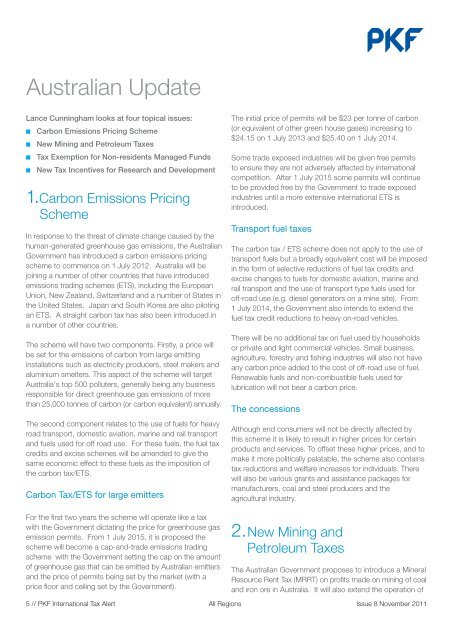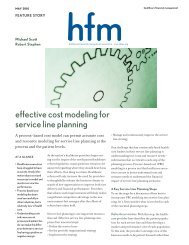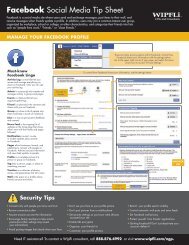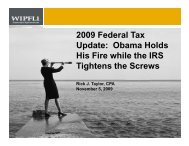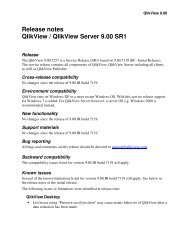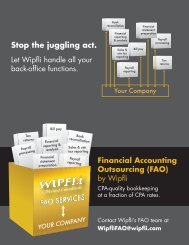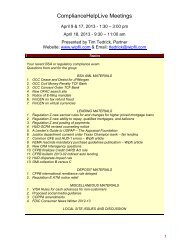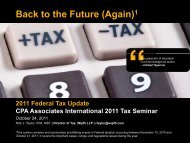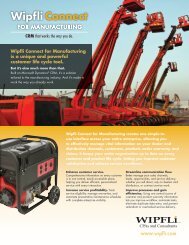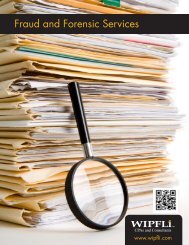Download PDF - Wipfli
Download PDF - Wipfli
Download PDF - Wipfli
Create successful ePaper yourself
Turn your PDF publications into a flip-book with our unique Google optimized e-Paper software.
Australian Update<br />
Lance Cunningham looks at four topical issues:<br />
■ Carbon Emissions Pricing Scheme<br />
■ New Mining and Petroleum Taxes<br />
■ Tax Exemption for Non-residents Managed Funds<br />
■ New Tax Incentives for Research and Development<br />
1.Carbon Emissions Pricing<br />
Scheme<br />
In response to the threat of climate change caused by the<br />
human-generated greenhouse gas emissions, the Australian<br />
Government has introduced a carbon emissions pricing<br />
scheme to commence on 1 July 2012. Australia will be<br />
joining a number of other countries that have introduced<br />
emissions trading schemes (ETS), including the European<br />
Union, New Zealand, Switzerland and a number of States in<br />
the United States. Japan and South Korea are also piloting<br />
an ETS. A straight carbon tax has also been introduced in<br />
a number of other countries.<br />
The scheme will have two components. Firstly, a price will<br />
be set for the emissions of carbon from large emitting<br />
installations such as electricity producers, steel makers and<br />
aluminium smelters. This aspect of the scheme will target<br />
Australia's top 500 polluters, generally being any business<br />
responsible for direct greenhouse gas emissions of more<br />
than 25,000 tonnes of carbon (or carbon equivalent) annually.<br />
The second component relates to the use of fuels for heavy<br />
road transport, domestic aviation, marine and rail transport<br />
and fuels used for off road use. For these fuels, the fuel tax<br />
credits and excise schemes will be amended to give the<br />
same economic effect to these fuels as the imposition of<br />
the carbon tax/ETS.<br />
Carbon Tax/ETS for large emitters<br />
For the first two years the scheme will operate like a tax<br />
with the Government dictating the price for greenhouse gas<br />
emission permits. From 1 July 2015, it is proposed the<br />
scheme will become a cap-and-trade emissions trading<br />
scheme with the Government setting the cap on the amount<br />
of greenhouse gas that can be emitted by Australian emitters<br />
and the price of permits being set by the market (with a<br />
price floor and ceiling set by the Government).<br />
The initial price of permits will be $23 per tonne of carbon<br />
(or equivalent of other green house gases) increasing to<br />
$24.15 on 1 July 2013 and $25.40 on 1 July 2014.<br />
Some trade exposed industries will be given free permits<br />
to ensure they are not adversely affected by international<br />
competition. After 1 July 2015 some permits will continue<br />
to be provided free by the Government to trade exposed<br />
industries until a more extensive international ETS is<br />
introduced.<br />
Transport fuel taxes<br />
The carbon tax / ETS scheme does not apply to the use of<br />
transport fuels but a broadly equivalent cost will be imposed<br />
in the form of selective reductions of fuel tax credits and<br />
excise changes to fuels for domestic aviation, marine and<br />
rail transport and the use of transport type fuels used for<br />
off-road use (e.g. diesel generators on a mine site). From<br />
1 July 2014, the Government also intends to extend the<br />
fuel tax credit reductions to heavy on-road vehicles.<br />
There will be no additional tax on fuel used by households<br />
or private and light commercial vehicles. Small business,<br />
agriculture, forestry and fishing industries will also not have<br />
any carbon price added to the cost of off-road use of fuel.<br />
Renewable fuels and non-combustible fuels used for<br />
lubrication will not bear a carbon price.<br />
The concessions<br />
Although end consumers will not be directly affected by<br />
this scheme it is likely to result in higher prices for certain<br />
products and services. To offset these higher prices, and to<br />
make it more politically palatable, the scheme also contains<br />
tax reductions and welfare increases for individuals. There<br />
will also be various grants and assistance packages for<br />
manufacturers, coal and steel producers and the<br />
agricultural industry.<br />
2.New Mining and<br />
Petroleum Taxes<br />
The Australian Government proposes to introduce a Mineral<br />
Resource Rent Tax (MRRT) on profits made on mining of coal<br />
and iron ore in Australia. It will also extend the operation of<br />
5 // PKF International Tax Alert All Regions<br />
Issue 8 November 2011


